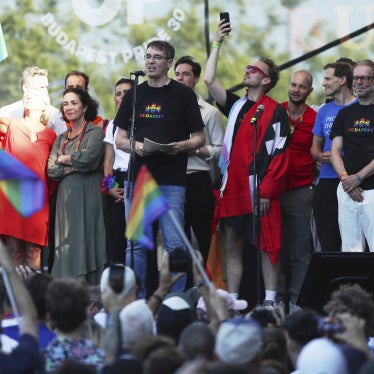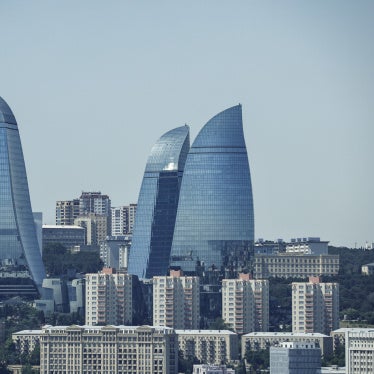Human Rights Watch welcomes the report of the Special Rapporteur on the situation of human rights in Belarus. We share the Special Rapporteur’s view that “human rights remain systemically and systematically restricted” in Belarus.
Governmental harassment of human rights defenders, independent media, and defense lawyers continues, including through arbitrary bans on foreign travel.
In 2012, the government pardoned several prisoners convicted of “rioting” in connection with the December 2010 mass protests. But all released prisoners had to sign a request for pardon that acknowledged their guilt. At least 11 political prisoners remain jailed. It is worth noting that among the individuals in prison on politically motivated charges is one of the country’s top human rights leaders, Ales Bialiatski, who is Chairman of Viasna Human Rights Center and who has personally met with many of the delegations here today. In its August 2012 decision No. 39/2012, the Working Group on Arbitrary Detention determined that Bialiatski was arbitrarily detained and called for his release. The Belarusian authorities have dismissed this decision and taken no steps to date to implement it. Ales Bialiatski has been in prison since his arrest in August 2011, and is serving a four-and-a-half-year prison term on completely bogus tax evasion charges.
In addition, allegations of torture and mistreatment in custody persist.
Harassment and intimidation of human rights groups has also continued in the country. On February 25, 2013, Taxation Ministry officials served Aleh Hulak, leader of the Belarusian Helsinki Committee, with a warrant to seize the group’s property. This is the latest government effort to abuse tax and administrative regulations to silence the independent rights monitoring group. The Belarusian Helsinki Committee is now the only human rights organization with registration status to operate nationally. The authorities may claim these are routine legal measures, but their intentions clearly are to silence the last remaining critical voices in the country.
The Belarusian government has continued to severely curtail freedoms of association, assembly, and expression, and the right to fair trial. Article 193.1 of the Belarusian Criminal Code imposes criminal penalties for acting on behalf of unregistered organizations. In April 2013 the authorities resumed the practice of issuing warnings to activists for acting on behalf of unregistered organizations, which may further lead to invoking Article 193.1.
Authorities regularly prohibit peaceful gatherings and use “hooliganism” or similar misdemeanor charges to intimidate activists and prevent them from carrying out their work. Dozens have been sentenced, some repeatedly, to short-term detention. Independent journalists performing their professional duties during public assemblies are also detained on similar charges, most recently – after the April 26 Chernobyl Way rally.
In the beginning of 2013 the authorities launched an anti-lesbian, gay, bisexual and transgender (LGBT) campaign after a second attempt to register an LGBT rights group at the Ministry of Justice. Dozens of activists, who became founders of the group, were interrogated by the KGB and the police. In mid-January 2013 Siarhei Androsenka, Chairman of the Gay Belarus Human Rights Project, was detained at the Belarusian border and his passport was confiscated on the pretext that it was on “the list of falsified passports”, thus preventing him from foreign travel. The document was returned to him only in the beginning of May. In January 2013 the police conducted several raids at gay clubs in Minsk and Vitebsk, during which dozens of people were photographed and their personal data registered.
The mandate of the Special Rapporteur has helped maintaining much needed international attention on the ongoing repression in Belarus, two years after the beginning of the December 2010 post-electoral crackdown. At the core of the repression system in Belarus are the legal provisions, including article 193.1 of the criminal code, that constitute unjustified restrictions on freedom of association and assembly, freedom of expression and media freedom. The Belarus government should be urged to repeal these laws and we encourage the Special Rapporteur to identify all provisions which are contrary to Belarus’ international human rights obligations.








